University Healthcare Program Analysis: Medicare Program
VerifiedAdded on 2022/09/15
|6
|1194
|10
Report
AI Summary
This report analyzes the Medicare healthcare program, a federal health insurance initiative for senior adults, younger adults with disabilities, and individuals with End-Stage Renal Disease (ESRD). It details the program's four parts (A-D), associated costs, and projected outcomes, which include improved access to quality healthcare and enhanced quality of life and life expectancy for the target population. The report emphasizes the pivotal role of nurses in both the design and implementation phases of the program, highlighting their input in strategic planning, policy development, and patient care management. It also outlines the composition of a healthcare team, including nurses, doctors, and patients, and explains the significance of each member in ensuring the program's effectiveness. The report concludes by differentiating between the administrative and patient-centered roles of nurses in the program's lifecycle.

Running head: HEALTH SCIENCE 1
Health Science
Student’s Name:
Instructor’s Name:
Name of University:
Course Number:
Date of Submission
Health Science
Student’s Name:
Instructor’s Name:
Name of University:
Course Number:
Date of Submission
Paraphrase This Document
Need a fresh take? Get an instant paraphrase of this document with our AI Paraphraser
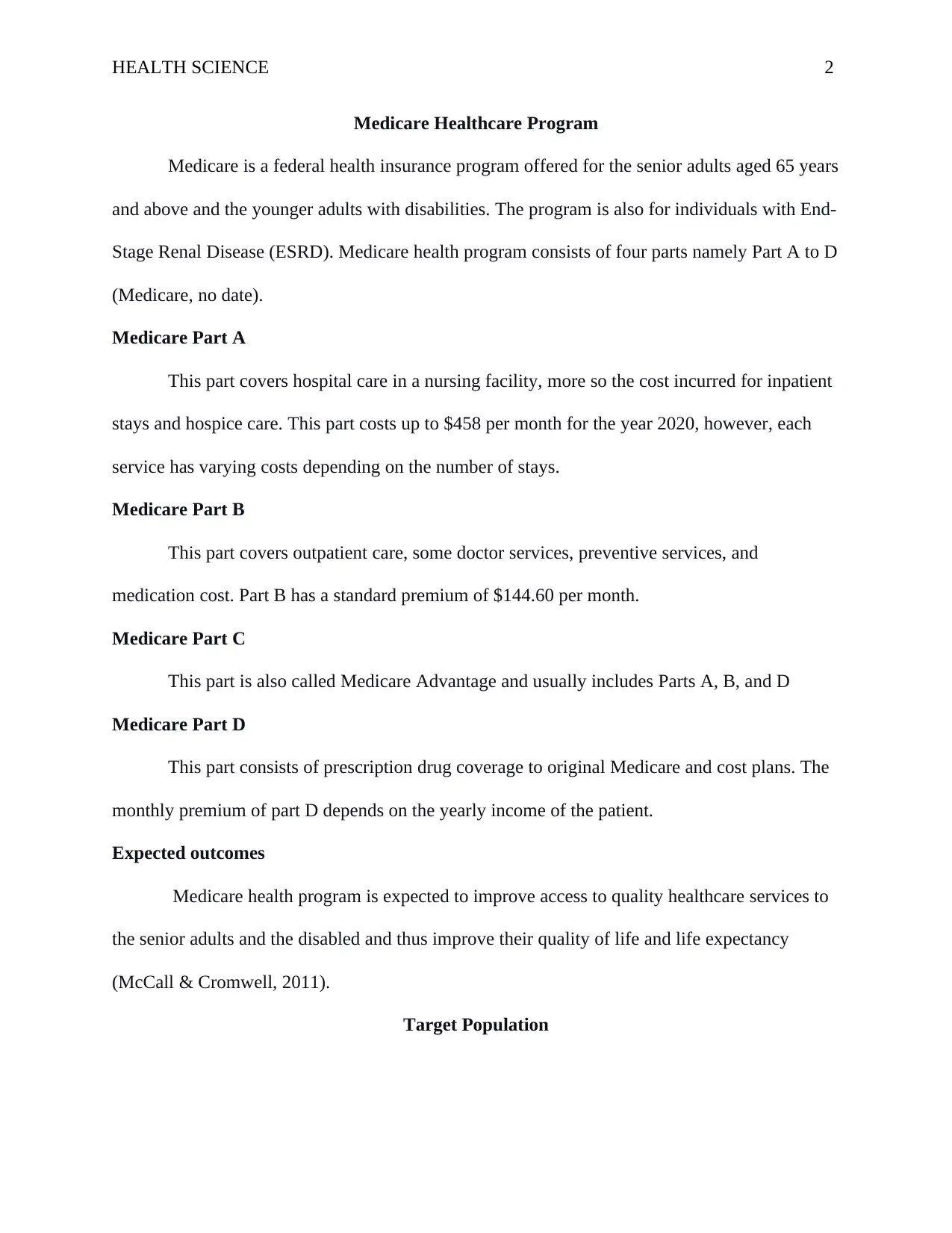
HEALTH SCIENCE 2
Medicare Healthcare Program
Medicare is a federal health insurance program offered for the senior adults aged 65 years
and above and the younger adults with disabilities. The program is also for individuals with End-
Stage Renal Disease (ESRD). Medicare health program consists of four parts namely Part A to D
(Medicare, no date).
Medicare Part A
This part covers hospital care in a nursing facility, more so the cost incurred for inpatient
stays and hospice care. This part costs up to $458 per month for the year 2020, however, each
service has varying costs depending on the number of stays.
Medicare Part B
This part covers outpatient care, some doctor services, preventive services, and
medication cost. Part B has a standard premium of $144.60 per month.
Medicare Part C
This part is also called Medicare Advantage and usually includes Parts A, B, and D
Medicare Part D
This part consists of prescription drug coverage to original Medicare and cost plans. The
monthly premium of part D depends on the yearly income of the patient.
Expected outcomes
Medicare health program is expected to improve access to quality healthcare services to
the senior adults and the disabled and thus improve their quality of life and life expectancy
(McCall & Cromwell, 2011).
Target Population
Medicare Healthcare Program
Medicare is a federal health insurance program offered for the senior adults aged 65 years
and above and the younger adults with disabilities. The program is also for individuals with End-
Stage Renal Disease (ESRD). Medicare health program consists of four parts namely Part A to D
(Medicare, no date).
Medicare Part A
This part covers hospital care in a nursing facility, more so the cost incurred for inpatient
stays and hospice care. This part costs up to $458 per month for the year 2020, however, each
service has varying costs depending on the number of stays.
Medicare Part B
This part covers outpatient care, some doctor services, preventive services, and
medication cost. Part B has a standard premium of $144.60 per month.
Medicare Part C
This part is also called Medicare Advantage and usually includes Parts A, B, and D
Medicare Part D
This part consists of prescription drug coverage to original Medicare and cost plans. The
monthly premium of part D depends on the yearly income of the patient.
Expected outcomes
Medicare health program is expected to improve access to quality healthcare services to
the senior adults and the disabled and thus improve their quality of life and life expectancy
(McCall & Cromwell, 2011).
Target Population
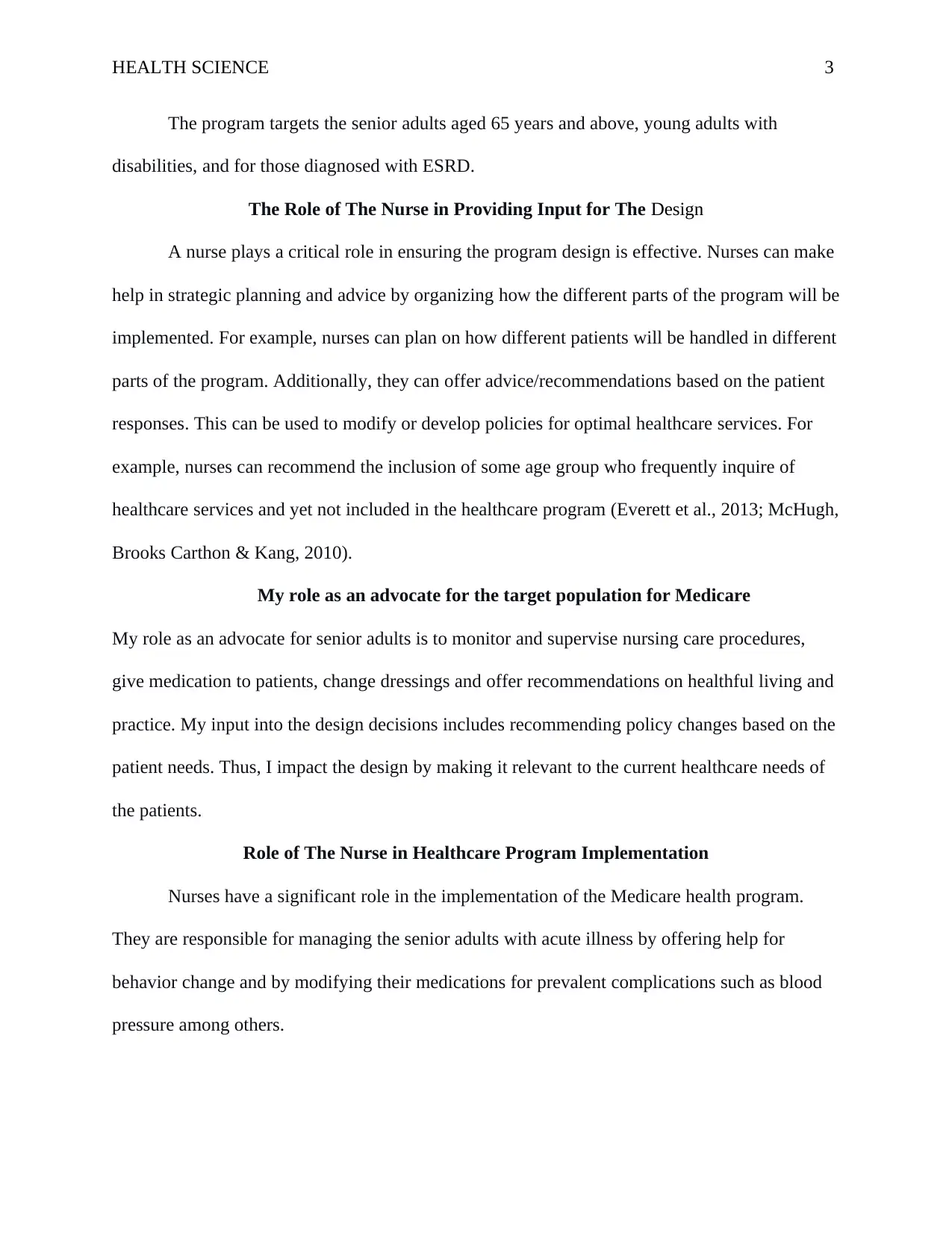
HEALTH SCIENCE 3
The program targets the senior adults aged 65 years and above, young adults with
disabilities, and for those diagnosed with ESRD.
The Role of The Nurse in Providing Input for The Design
A nurse plays a critical role in ensuring the program design is effective. Nurses can make
help in strategic planning and advice by organizing how the different parts of the program will be
implemented. For example, nurses can plan on how different patients will be handled in different
parts of the program. Additionally, they can offer advice/recommendations based on the patient
responses. This can be used to modify or develop policies for optimal healthcare services. For
example, nurses can recommend the inclusion of some age group who frequently inquire of
healthcare services and yet not included in the healthcare program (Everett et al., 2013; McHugh,
Brooks Carthon & Kang, 2010).
My role as an advocate for the target population for Medicare
My role as an advocate for senior adults is to monitor and supervise nursing care procedures,
give medication to patients, change dressings and offer recommendations on healthful living and
practice. My input into the design decisions includes recommending policy changes based on the
patient needs. Thus, I impact the design by making it relevant to the current healthcare needs of
the patients.
Role of The Nurse in Healthcare Program Implementation
Nurses have a significant role in the implementation of the Medicare health program.
They are responsible for managing the senior adults with acute illness by offering help for
behavior change and by modifying their medications for prevalent complications such as blood
pressure among others.
The program targets the senior adults aged 65 years and above, young adults with
disabilities, and for those diagnosed with ESRD.
The Role of The Nurse in Providing Input for The Design
A nurse plays a critical role in ensuring the program design is effective. Nurses can make
help in strategic planning and advice by organizing how the different parts of the program will be
implemented. For example, nurses can plan on how different patients will be handled in different
parts of the program. Additionally, they can offer advice/recommendations based on the patient
responses. This can be used to modify or develop policies for optimal healthcare services. For
example, nurses can recommend the inclusion of some age group who frequently inquire of
healthcare services and yet not included in the healthcare program (Everett et al., 2013; McHugh,
Brooks Carthon & Kang, 2010).
My role as an advocate for the target population for Medicare
My role as an advocate for senior adults is to monitor and supervise nursing care procedures,
give medication to patients, change dressings and offer recommendations on healthful living and
practice. My input into the design decisions includes recommending policy changes based on the
patient needs. Thus, I impact the design by making it relevant to the current healthcare needs of
the patients.
Role of The Nurse in Healthcare Program Implementation
Nurses have a significant role in the implementation of the Medicare health program.
They are responsible for managing the senior adults with acute illness by offering help for
behavior change and by modifying their medications for prevalent complications such as blood
pressure among others.
⊘ This is a preview!⊘
Do you want full access?
Subscribe today to unlock all pages.

Trusted by 1+ million students worldwide
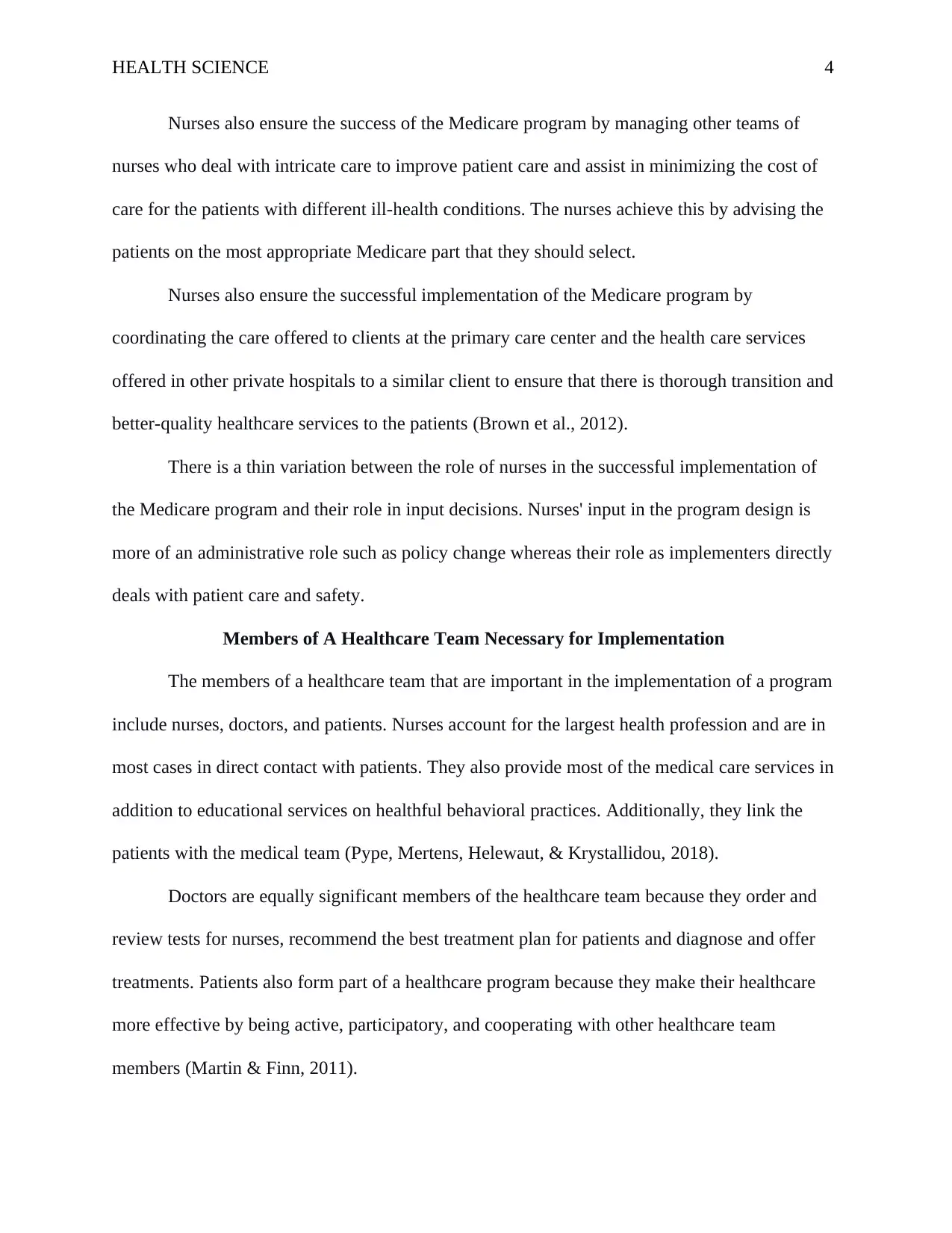
HEALTH SCIENCE 4
Nurses also ensure the success of the Medicare program by managing other teams of
nurses who deal with intricate care to improve patient care and assist in minimizing the cost of
care for the patients with different ill-health conditions. The nurses achieve this by advising the
patients on the most appropriate Medicare part that they should select.
Nurses also ensure the successful implementation of the Medicare program by
coordinating the care offered to clients at the primary care center and the health care services
offered in other private hospitals to a similar client to ensure that there is thorough transition and
better-quality healthcare services to the patients (Brown et al., 2012).
There is a thin variation between the role of nurses in the successful implementation of
the Medicare program and their role in input decisions. Nurses' input in the program design is
more of an administrative role such as policy change whereas their role as implementers directly
deals with patient care and safety.
Members of A Healthcare Team Necessary for Implementation
The members of a healthcare team that are important in the implementation of a program
include nurses, doctors, and patients. Nurses account for the largest health profession and are in
most cases in direct contact with patients. They also provide most of the medical care services in
addition to educational services on healthful behavioral practices. Additionally, they link the
patients with the medical team (Pype, Mertens, Helewaut, & Krystallidou, 2018).
Doctors are equally significant members of the healthcare team because they order and
review tests for nurses, recommend the best treatment plan for patients and diagnose and offer
treatments. Patients also form part of a healthcare program because they make their healthcare
more effective by being active, participatory, and cooperating with other healthcare team
members (Martin & Finn, 2011).
Nurses also ensure the success of the Medicare program by managing other teams of
nurses who deal with intricate care to improve patient care and assist in minimizing the cost of
care for the patients with different ill-health conditions. The nurses achieve this by advising the
patients on the most appropriate Medicare part that they should select.
Nurses also ensure the successful implementation of the Medicare program by
coordinating the care offered to clients at the primary care center and the health care services
offered in other private hospitals to a similar client to ensure that there is thorough transition and
better-quality healthcare services to the patients (Brown et al., 2012).
There is a thin variation between the role of nurses in the successful implementation of
the Medicare program and their role in input decisions. Nurses' input in the program design is
more of an administrative role such as policy change whereas their role as implementers directly
deals with patient care and safety.
Members of A Healthcare Team Necessary for Implementation
The members of a healthcare team that are important in the implementation of a program
include nurses, doctors, and patients. Nurses account for the largest health profession and are in
most cases in direct contact with patients. They also provide most of the medical care services in
addition to educational services on healthful behavioral practices. Additionally, they link the
patients with the medical team (Pype, Mertens, Helewaut, & Krystallidou, 2018).
Doctors are equally significant members of the healthcare team because they order and
review tests for nurses, recommend the best treatment plan for patients and diagnose and offer
treatments. Patients also form part of a healthcare program because they make their healthcare
more effective by being active, participatory, and cooperating with other healthcare team
members (Martin & Finn, 2011).
Paraphrase This Document
Need a fresh take? Get an instant paraphrase of this document with our AI Paraphraser
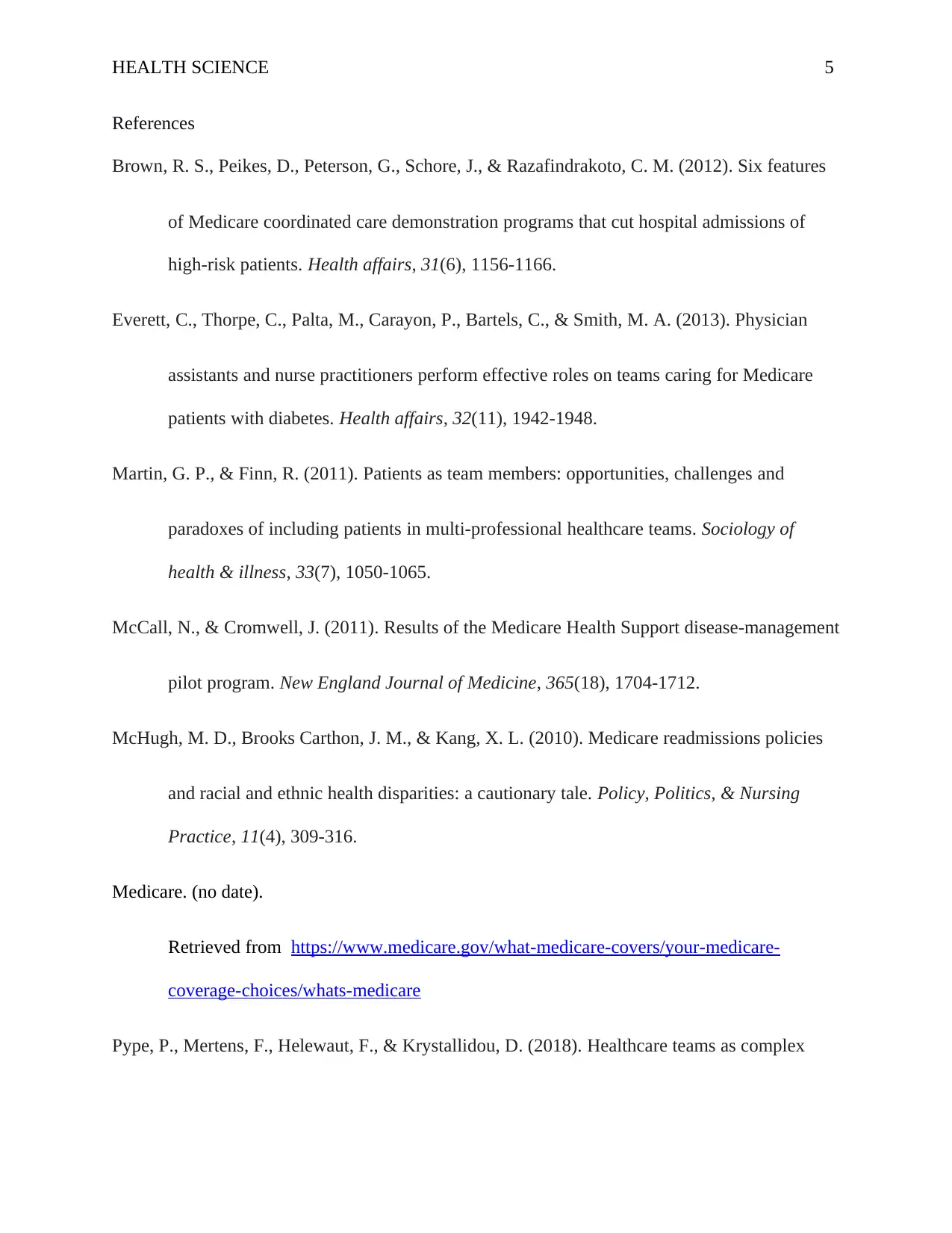
HEALTH SCIENCE 5
References
Brown, R. S., Peikes, D., Peterson, G., Schore, J., & Razafindrakoto, C. M. (2012). Six features
of Medicare coordinated care demonstration programs that cut hospital admissions of
high-risk patients. Health affairs, 31(6), 1156-1166.
Everett, C., Thorpe, C., Palta, M., Carayon, P., Bartels, C., & Smith, M. A. (2013). Physician
assistants and nurse practitioners perform effective roles on teams caring for Medicare
patients with diabetes. Health affairs, 32(11), 1942-1948.
Martin, G. P., & Finn, R. (2011). Patients as team members: opportunities, challenges and
paradoxes of including patients in multi‐professional healthcare teams. Sociology of
health & illness, 33(7), 1050-1065.
McCall, N., & Cromwell, J. (2011). Results of the Medicare Health Support disease-management
pilot program. New England Journal of Medicine, 365(18), 1704-1712.
McHugh, M. D., Brooks Carthon, J. M., & Kang, X. L. (2010). Medicare readmissions policies
and racial and ethnic health disparities: a cautionary tale. Policy, Politics, & Nursing
Practice, 11(4), 309-316.
Medicare. (no date).
Retrieved from https://www.medicare.gov/what-medicare-covers/your-medicare-
coverage-choices/whats-medicare
Pype, P., Mertens, F., Helewaut, F., & Krystallidou, D. (2018). Healthcare teams as complex
References
Brown, R. S., Peikes, D., Peterson, G., Schore, J., & Razafindrakoto, C. M. (2012). Six features
of Medicare coordinated care demonstration programs that cut hospital admissions of
high-risk patients. Health affairs, 31(6), 1156-1166.
Everett, C., Thorpe, C., Palta, M., Carayon, P., Bartels, C., & Smith, M. A. (2013). Physician
assistants and nurse practitioners perform effective roles on teams caring for Medicare
patients with diabetes. Health affairs, 32(11), 1942-1948.
Martin, G. P., & Finn, R. (2011). Patients as team members: opportunities, challenges and
paradoxes of including patients in multi‐professional healthcare teams. Sociology of
health & illness, 33(7), 1050-1065.
McCall, N., & Cromwell, J. (2011). Results of the Medicare Health Support disease-management
pilot program. New England Journal of Medicine, 365(18), 1704-1712.
McHugh, M. D., Brooks Carthon, J. M., & Kang, X. L. (2010). Medicare readmissions policies
and racial and ethnic health disparities: a cautionary tale. Policy, Politics, & Nursing
Practice, 11(4), 309-316.
Medicare. (no date).
Retrieved from https://www.medicare.gov/what-medicare-covers/your-medicare-
coverage-choices/whats-medicare
Pype, P., Mertens, F., Helewaut, F., & Krystallidou, D. (2018). Healthcare teams as complex
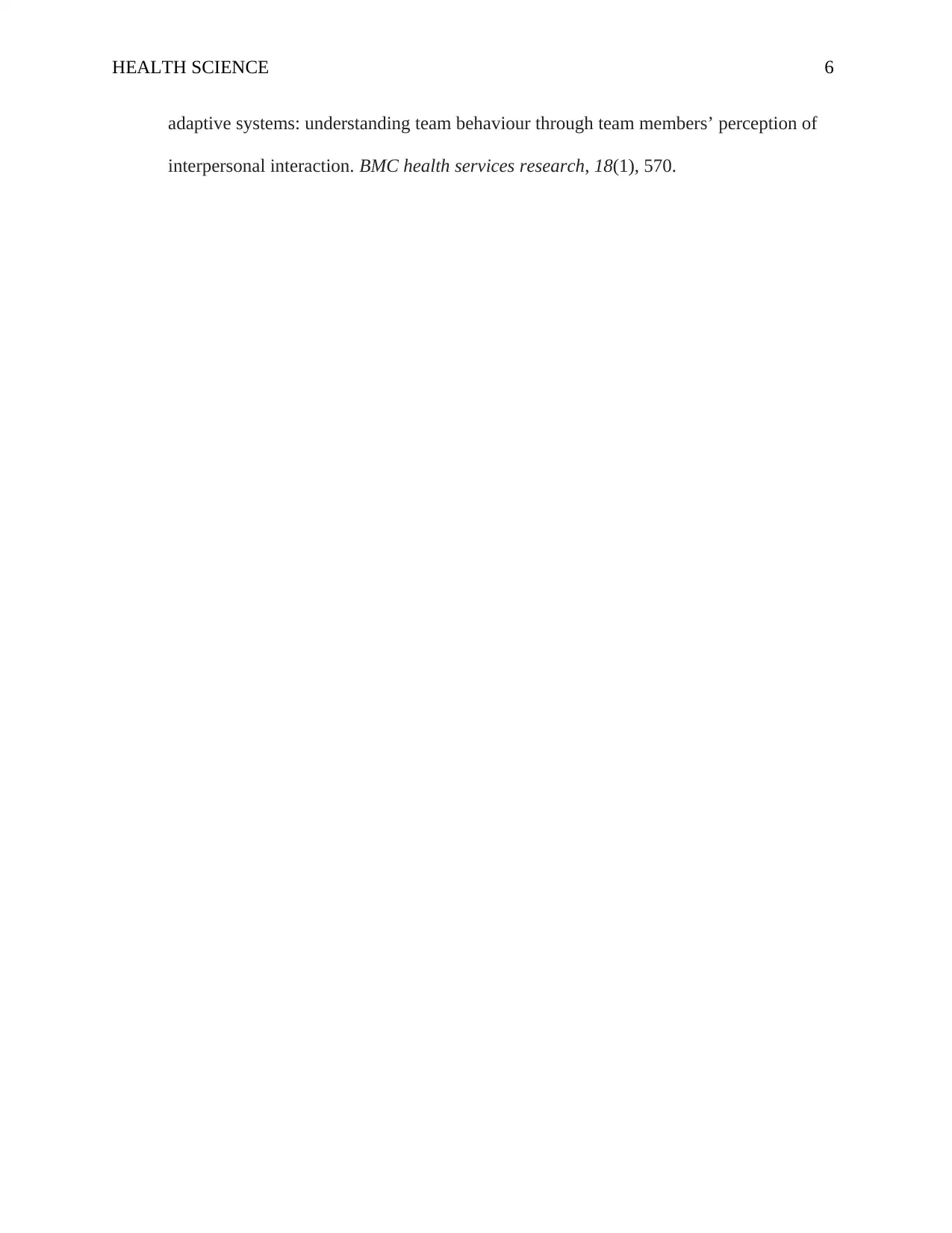
HEALTH SCIENCE 6
adaptive systems: understanding team behaviour through team members’ perception of
interpersonal interaction. BMC health services research, 18(1), 570.
adaptive systems: understanding team behaviour through team members’ perception of
interpersonal interaction. BMC health services research, 18(1), 570.
⊘ This is a preview!⊘
Do you want full access?
Subscribe today to unlock all pages.

Trusted by 1+ million students worldwide
1 out of 6
Related Documents
Your All-in-One AI-Powered Toolkit for Academic Success.
+13062052269
info@desklib.com
Available 24*7 on WhatsApp / Email
![[object Object]](/_next/static/media/star-bottom.7253800d.svg)
Unlock your academic potential
Copyright © 2020–2026 A2Z Services. All Rights Reserved. Developed and managed by ZUCOL.





